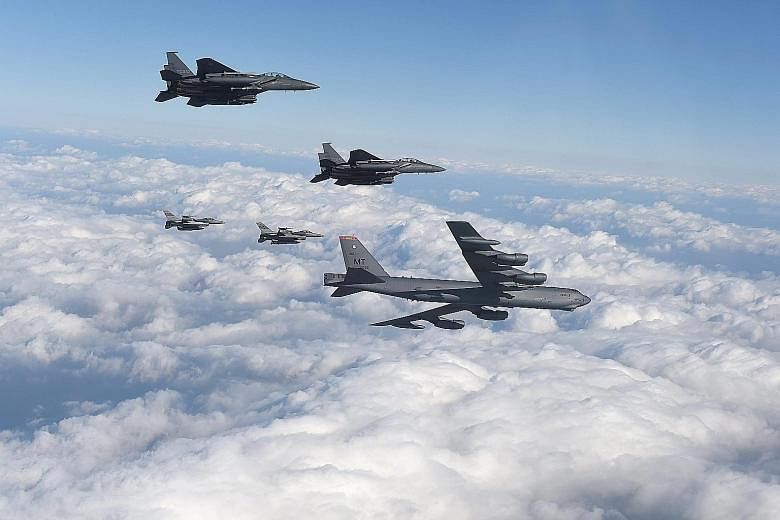United States forces stationed in South Korea have been put on the highest alert, as the two countries discussed deploying more strategic assets to the Korean Peninsula after a US B-52 bomber flew over the South in a show of force against North Korea on Sunday.
Tensions have escalated since Pyongyang claimed it tested a hydrogen bomb last week, with the two Koreas continuing to blast loudspeaker propaganda along the border yesterday.
North Korean leader Kim Jong Un praised his scientists for building the country's latest bomb and told them to do more to boost their nuclear arsenal, according to the official Korean Central News Agency.
South Korean President Park Geun Hye is expected to deliver a national address tomorrow morning and focus on issues relating to North Korea's nuclear test as well as key reforms aimed at revitalising the economy, said a presidential office spokesman.
South Korea's Defence Ministry said yesterday that Seoul and Washington are having "close and continuous discussions" about further deployment of American strategic assets.
A ministry spokesman declined to give details, but the ministry had said last week that US military assets to be deployed could include nuclear-powered submarines and F-22 stealth fighter jets.
Some observers, however, are sceptical about the deterrent effect of such a deployment, citing a similar reaction to Pyongyang's 2013 nuclear test that obviously failed to curb the Kim regime's nuclear ambitions. The nuclear test last Wednesday was the fourth since 2006.
Despite knowing that its move could invite more sanctions, North Korea said it successfully tested a hydrogen bomb - a claim disputed by international experts, who doubt that the reclusive state has the technology to detonate such a powerful nuclear device.
Sejong Institute's senior research fellow Chung Eun Sook said it is worrisome there seems nothing much world leaders can do to stop North Korea from conducting a fifth or sixth nuclear test. "It becomes a vicious circle," she added.
China, meanwhile, has urged Seoul and Washington to "exercise restraint" and take prudent actions to avoid raising tension, in yet another move suggesting that Beijing will not exert additional pressure on Pyongyang.
Maintaining peace and stability in North-east Asia would "serve the common interests of all relevant parties", said China's Foreign Ministry, which has maintained that dialogue is key to denuclearising North Korea.
This is despite South Korea and the US both urging China, which wields considerable economic power over North Korea as its largest trade partner, to do more to rein in the Kim regime.
South Korea has also stepped up efforts to engage its partners in the six-party talks on punitive measures against Pyongyang.
Stalled since 2008, the talks involving the US, China, Russia, Japan and the two Koreas are aimed at halting the North's nuclear ambitions.
South Korea's chief nuclear negotiator Hwang Joon Kook is expected to meet his US and Japanese counterparts in Seoul tomorrow. This will be followed by a meeting with China on Thursday.
The vice-foreign ministers of South Korea, the US and Japan are also expected to meet in Tokyo later this week.

